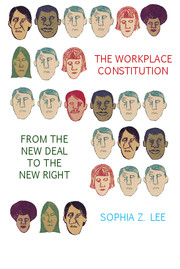Book contents
- Frontmatter
- Contents
- Acknowledgments
- Introduction
- Part I Crafting the Workplace Constitution in the New Deal 1930s and 1940s
- Part II Advancing the Workplace Constitution in the Cold War 1950s
- Part III Administering the Liberal Workplace Constitution in the Long 1960s
- Part IV The Workplace Constitution in the New Right 1970s and 1980s
- 10 Conservatives Reject the Liberal Workplace Constitution
- 11 Liberals Rethink the Workplace Constitution
- 12 Conservatives Unite the Workplace Constitutions
- 13 The Conservative Workplace Constitution Divides the New Right Coalition
- Epilogue
- Appendix: Figures
- Notes
- Selected Bibliography of Primary Sources
- Index
10 - Conservatives Reject the Liberal Workplace Constitution
Published online by Cambridge University Press: 05 October 2014
- Frontmatter
- Contents
- Acknowledgments
- Introduction
- Part I Crafting the Workplace Constitution in the New Deal 1930s and 1940s
- Part II Advancing the Workplace Constitution in the Cold War 1950s
- Part III Administering the Liberal Workplace Constitution in the Long 1960s
- Part IV The Workplace Constitution in the New Right 1970s and 1980s
- 10 Conservatives Reject the Liberal Workplace Constitution
- 11 Liberals Rethink the Workplace Constitution
- 12 Conservatives Unite the Workplace Constitutions
- 13 The Conservative Workplace Constitution Divides the New Right Coalition
- Epilogue
- Appendix: Figures
- Notes
- Selected Bibliography of Primary Sources
- Index
Summary
“A primrose path on the 14th Amendment”
Chief Justice Warren BurgerIn October 1972, conference goers gathered at an elegant five-star hotel on the pristine shores of Italy’s Lake Como. William Taylor, the former staff director of the United States Civil Rights Commission, delivered a talk entitled “Problems in Developing and Enforcing Fair Employment Law in the United States.” Despite some notable courtroom victories under Title VII, Taylor contended, “there are still major limitations upon relying on law suits as the sole or even principal instrument of implementing fair employment policy.” Agencies had a “great deal of expertise in the business practices of the industries they regulate,” he observed. As a result, they were better than courts at evaluating whether employment qualifications that tended to exclude African Americans were justified. Additionally, lawsuits affected only a single employer, he pointed out, but “the mere issuance of regulations prohibiting employment discrimination” might “induce a great deal of voluntary compliance.” Agencies’ power to approve or reject rate increases or license applications gave them “enormous leverage” in regulated industries “with significant equal employment problems,” from airlines to banking, Taylor explained. The gas and utility companies overseen by the Federal Power Commission (FPC) alone, he noted, had “perhaps the worst record of any major industry in employing minorities.”
Taylor’s talk was not idle; he and his allies had recently petitioned all the major regulatory agencies for equal employment rules. Taylor had long urged that “federal agencies ... are under a constitutional duty to prevent racial discrimination” by their regulatees. After graduating from Yale Law School in 1954, Taylor had worked on the Gulf Coast oil cases with the NAACP’s Robert Carter. Later, he helped the Kennedy and Johnson administrations “be more inventive in the use of the law and government to fulfill the promise of the Constitution.” Taylor left government in 1968 convinced that federal agencies would not “enforce civil rights laws without private monitoring and pressure,” something he thought civil rights organizations failed to provide. To fill this gap, he founded the Center for National Policy Review at Catholic University and helped engineer equal employment rulemaking petitions.
- Type
- Chapter
- Information
- The Workplace Constitution from the New Deal to the New Right , pp. 193 - 211Publisher: Cambridge University PressPrint publication year: 2014



